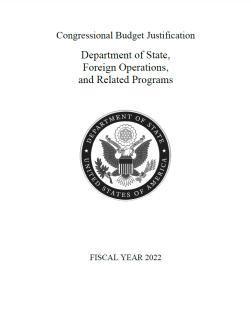At a moment of unprecedented challenge and change, it is essential for the United States to work in common cause with our allies and partners around the world to advance our vital interests, promote shared prosperity, and defend our democratic values. The Biden Administration has outlined a bold agenda to revitalize U.S. leadership to accelerate our domestic renewal, deliver for all Americans, and meet the tests before us - from ending COVID-19 to dealing with the climate crisis to outcompeting China - from a position of strength.
The FY 2022 budget request of $58.5 billion for the State Department and USAID would allow us to chart this course while reinvesting in our most potent asset- our people. It reflects the importance the Biden-Harris Administration places on U.S. global leadership and our belief that diplomacy and development are vital tools for advancing U.S. interests.
The greatest challenges to our national security cannot be solved by the United States alone. These requested budgetary resources will enable the State Depai1ment and USAID to strengthen and modernize our alliances and partnerships and marshal the tools of diplomacy, development, and economic statecraft to protect our security, prosperity, and democratic way of life in the face of authoritarian challenges and malign influence.
These resources will help us address the critical public health and economic threats posed by COVID-19 and invest in global health security so we can prevent and respond effectively to future global health crises. They will al low us to tackle the climate crisis, address the root causes of irregular migration, and shape the rules of the road in cyberspace and for emerging technologies that pose both risks and opportunities for the American people. They will enable our diplomats to help ensure a level playing field for America's workers and businesses and drive inclusive, equitable economic growth. The budget also enables the United States to revitalize its humanitarian leadership at a moment of extraordinary need around the world. This budget will also allow the United States to ensure we uphold and defend the principles and values of the international order we helped bui ld, wherever and whenever they are under threat. By beginning to pay several years' worth of accumulated UN peacekeeping arrears, for example, we will be in a better position to advance UN reform and effectiveness and secure leadership positions across international organizations for ourselves and our like-minded partners.
Implementing this agenda calls for investments in a global workforce that more fully represents the breadth of America's talent and diversity. Our workforce serves on the frontlines to advance American interests at 276 U.S. missions in 195 countries and across the United States. Our extraordinary public servants provide consular services to U.S. citizens overseas and those who seek to come to our shores to visit, study, and invest in our communities. At a moment when our adversaries and competitors are making enormous investment in development and diplomacy, we must do more to sustain our competitive edge. We need to ensure that our workforce has the training and technology to do their jobs well - including state-of-the-art cybersecurity protections.
The American people rely on the U.S. Department of State and USAID every day. Our national security depends not only on the strength of our armed forces but also on our abil ity to conduct effective diplomacy and development. That is how we meet and solve global challenges, forge cooperation, advance our interests, protect our people abroad, and prevent crises overseas, including from escalating into emergencies at home. In all these ways, diplomacy and development are strong investments for American taxpayers - and far more economical compared to the alternatives.
Our mission is to keep Americans safe, defend our values, create opportunities for American workers, and tackle the global crises that are increasingly shaping our future. We greatly appreciate your continued support.

